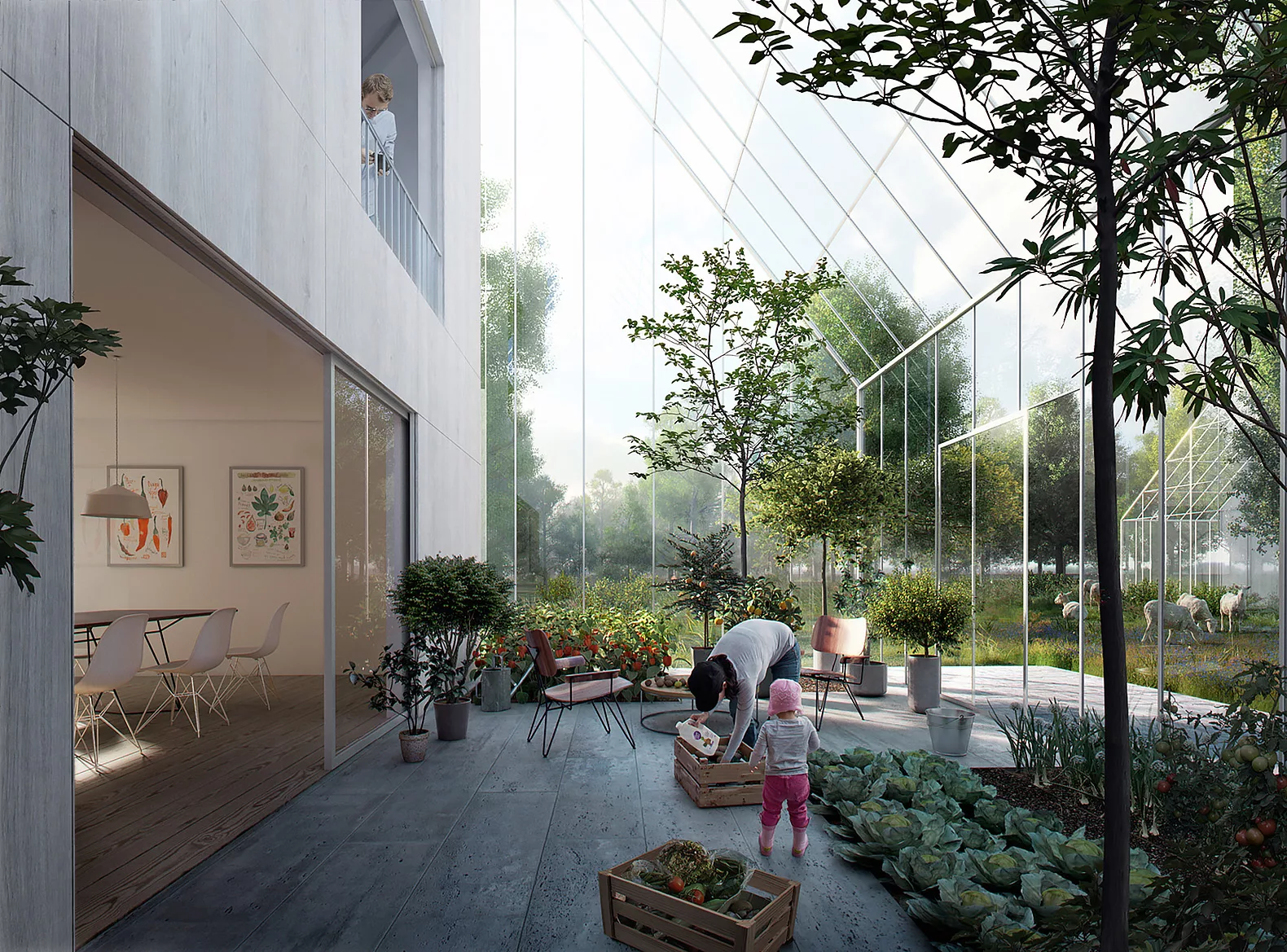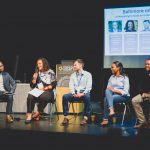A SOCAP guest post by Arjanna van der Plas

ReGen founder James Ehrlich is on a mission. He wants to make off the grid neighborhoods the most desirable housing option for everyone. Like Elon Musk has radically changed the image of electric cars, Ehrlich, who also works as an entrepreneur-in-residence at Stanford University, wants to make his beautiful, comfortable ecovillages the new standard of sustainable living.
“We want to make it easy, convenient and accessible for everyone to choose a sustainable lifestyle off the grid,” Ehrlich explains. “For ReGen, we are applying existing technologies into an integrated community design, providing clean energy, water and food right off your doorstep. We collaborate with Copenhagen-based architectural firm EFFEKT to make the ReGen villages stunningly gorgeous and comfortable to live in.”
Building the first ReGen village
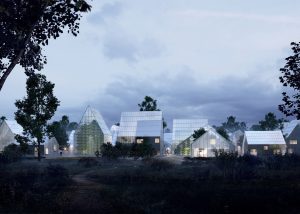 Together with Dutch partners, ReGen Villages Holding B.V. is building its first 200 homes in Almere, about 20 minutes by train from Amsterdam. Four other ReGen villages in Scandinavia and Germany are already planned. “We are launching our prototype in Almere, because the local government proved to be a great partner that is as excited about this sustainable living experiment as we are. We want to be the Tesla of eco-villages. So we’re coming out as a little bit higher-end for Northern Europe. Starting in the Netherlands and Scandinavia allows us to tackle two difficult climate areas, the wet and the cold. That experience will make us more successful in scaling up to our ultimate goal of serving communities in developing countries. We are looking at the growing and upward moving population of rural India and sub-Saharan Africa. If they all want to live in the same kind of suburbs as we are currently building, the people won’t be able to thrive and the planet is not going to make it. We have to provide them with a comfortable, sustainable alternative.”
Together with Dutch partners, ReGen Villages Holding B.V. is building its first 200 homes in Almere, about 20 minutes by train from Amsterdam. Four other ReGen villages in Scandinavia and Germany are already planned. “We are launching our prototype in Almere, because the local government proved to be a great partner that is as excited about this sustainable living experiment as we are. We want to be the Tesla of eco-villages. So we’re coming out as a little bit higher-end for Northern Europe. Starting in the Netherlands and Scandinavia allows us to tackle two difficult climate areas, the wet and the cold. That experience will make us more successful in scaling up to our ultimate goal of serving communities in developing countries. We are looking at the growing and upward moving population of rural India and sub-Saharan Africa. If they all want to live in the same kind of suburbs as we are currently building, the people won’t be able to thrive and the planet is not going to make it. We have to provide them with a comfortable, sustainable alternative.”
Smart resource flows and delicious local food
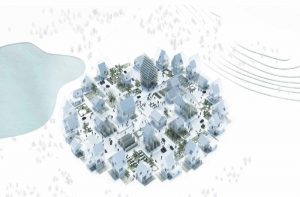 EFFEKT’s artist impressions of the ReGen villages show neighborhoods where nature and technology are integrated seamlessly. Existing green technologies are implemented to create a closed loop system.
EFFEKT’s artist impressions of the ReGen villages show neighborhoods where nature and technology are integrated seamlessly. Existing green technologies are implemented to create a closed loop system.
“Imagine sitting in your dining room in Almere. You casually grab some basil leaves from your indoor garden to add to the salad you made from the tomatoes from the seasonal garden behind your home. Only a few steps from your house, there are high-tech vertical farms that grow a variety of crops for you and your neighbors. Because we only grow food that flourish in the Dutch climate, you will still have to go to the store for coffee, but at least your kids will no longer think that carrots are made in factories.
When you are done with your meal, your compostable waste will feed livestock or soldier flies, who in turn will feed fish. Waste from the fish and the livestock will fertilize an aquaculture system that produces fruit and vegetables for the homes. A water storage system collects rainwater and graywater and redistributes it to the gardens and the aquaponic system.That’s just one example of the resources loops we are creating in the neighborhoods. These systems are highly efficient. Aquaponics for example produces 10 times as much produce on the same amount of land compared to traditional farming, with 90% less water.”
The neighborhoods will also produce their own energy, using a mixture of geothermal, solar, solar thermal, wind, and biomass, optimized for the local conditions. A smart grid will distribute power efficiently, sending it to a carport to charge shared electric cars as needed.
A thriving community
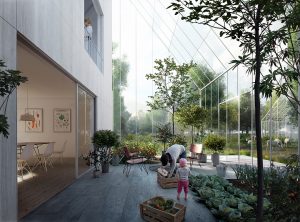 Ehrlich did not only focus on environmental and financial advantages. He also created a framework for creating a sense of community among the residents of the neighborhoods. They become part of a local ecosystem, where they reconnect with nature and enjoy growing their own food. “If they want to”, Ehrlich emphasizes,“we’ve created a system where residents can sign up to work in the garden and receive a reduction in their monthly association fees. But if people just want to live in a ReGen village without engaging in the activities, they are welcome to do so. People can live in these neighborhoods on their own terms.” Every regenerative neighborhood consists of 100 homes. And that’s not just a random number. “Sociological research shows that we thrive in communities of around 150 people. If we live in bigger conglomerates, it is hard for us to maintain stable social relationships.”
Ehrlich did not only focus on environmental and financial advantages. He also created a framework for creating a sense of community among the residents of the neighborhoods. They become part of a local ecosystem, where they reconnect with nature and enjoy growing their own food. “If they want to”, Ehrlich emphasizes,“we’ve created a system where residents can sign up to work in the garden and receive a reduction in their monthly association fees. But if people just want to live in a ReGen village without engaging in the activities, they are welcome to do so. People can live in these neighborhoods on their own terms.” Every regenerative neighborhood consists of 100 homes. And that’s not just a random number. “Sociological research shows that we thrive in communities of around 150 people. If we live in bigger conglomerates, it is hard for us to maintain stable social relationships.”
“An estimated 10 billion people will have to live on limited resources by 2050, which will put unprecedented demands on our clean water supplies, food systems, and energy systems. More and more people move to cities these days, but a UN report convinced me that we need to create small self-sufficient communities instead. I believe this is best for people and our planet. That’s why I work so hard to make this happen.”
Ehrlich presented ReGen Villages during SOCAP session Building a New Economy Ecosystem as 3D Chess
Want to learn more? Check out www.regenvillages.com and this short YouTube clip.
About the author
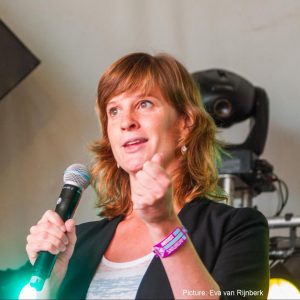 Arjanna van der Plas is a social impact focused author, yoga teacher and workshop facilitator. She currently spends most of her time in San Francisco’s Tenderloin neighborhood, teaching yoga and meditation at the Healing Well, and writing a book and blog series called Stories Behind The Fog together with the Free Range Puppies. With Stories Behind The Fog she wants to challenge the single-minded view of homelessness by rendering its entire spectrum, one story at a time.
Arjanna van der Plas is a social impact focused author, yoga teacher and workshop facilitator. She currently spends most of her time in San Francisco’s Tenderloin neighborhood, teaching yoga and meditation at the Healing Well, and writing a book and blog series called Stories Behind The Fog together with the Free Range Puppies. With Stories Behind The Fog she wants to challenge the single-minded view of homelessness by rendering its entire spectrum, one story at a time.
Before Arjanna moved to San Francisco, she was communications manager for the Amsterdam based sustainability startup Circle Economy. Prior to that, she was a lecturer at the TU Delft, innovator at TNO (the largest independent research organization in the Netherlands) and freelance science journalist. Arjanna holds two MSc. degrees from the TU Delft, one in Industrial Design Engineering and one in Science Communications. Follow her on Medium, Linkedin, and Twitter.
